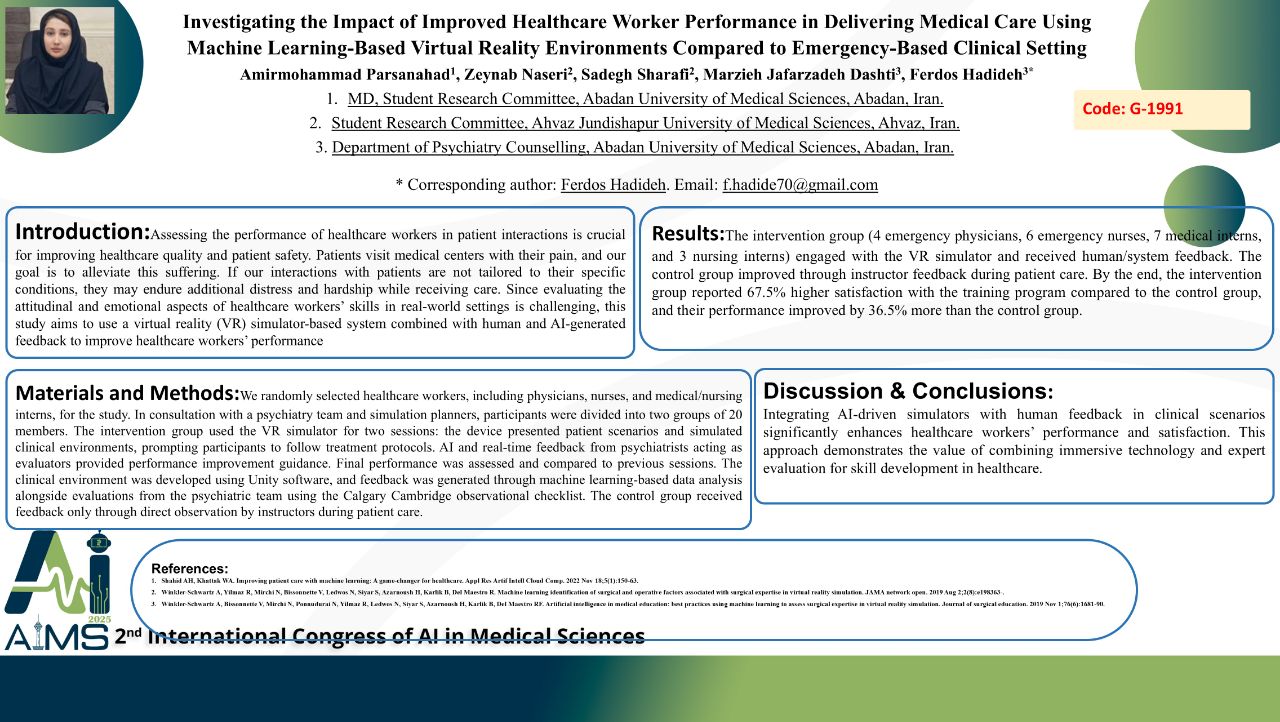Investigating the Impact of Improved Healthcare Worker Performance in Delivering Medical Care Using Machine Learning-Based Virtual Reality Environments Compared to Emergency-Based Clinical Setting
Code: G-1991
Authors: Amirmohammad Parsanahad, Zeynab Zeynab , Sadegh Sharafi, Marzieh Jafarzadeh Dashti, Ferdos Hadideh * ℗
Schedule: Not Scheduled!
Tag: Clinical Decision Support System
Download: Download Poster
Abstract:
Abstract
Background and aims: Assessing the performance of healthcare workers in patient interactions is crucial for improving healthcare quality and patient safety. Patients visit medical centers with their pain, and our goal is to alleviate this suffering. If our interactions with patients are not tailored to their specific conditions, they may endure additional distress and hardship while receiving care. Since evaluating the attitudinal and emotional aspects of healthcare workers’ skills in real-world settings is challenging, this study aims to use a virtual reality (VR) simulator-based system combined with human and AI-generated feedback to improve healthcare workers’ performance. Methods: We randomly selected healthcare workers, including physicians, nurses, and medical/nursing interns, for the study. In consultation with a psychiatry team and simulation planners, participants were divided into two groups of 20 members. The intervention group used the VR simulator for two sessions: the device presented patient scenarios and simulated clinical environments, prompting participants to follow treatment protocols. AI and real-time feedback from psychiatrists acting as evaluators provided performance improvement guidance. Final performance was assessed and compared to previous sessions. The clinical environment was developed using Unity software, and feedback was generated through machine learning-based data analysis alongside evaluations from the psychiatric team using the Calgary Cambridge observational checklist. The control group received feedback only through direct observation by instructors during patient care. Results: The intervention group (4 emergency physicians, 6 emergency nurses, 7 medical interns, and 3 nursing interns) engaged with the VR simulator and received human/system feedback. The control group improved through instructor feedback during patient care. By the end, the intervention group reported 67.5% higher satisfaction with the training program compared to the control group, and their performance improved by 36.5% more than the control group. Conclusion: Integrating AI-driven simulators with human feedback in clinical scenarios significantly enhances healthcare workers’ performance and satisfaction. This approach demonstrates the value of combining immersive technology and expert evaluation for skill development in healthcare.
Keywords
Virtual Reality, Patient Care, Machine Learning.
